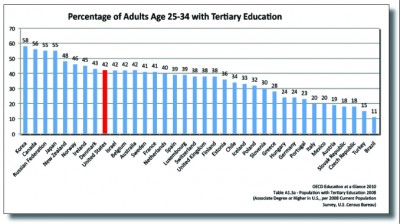President Barack Obama’s American Graduation Initiative (AGI) took a step forward today with the announcement of a “college completion tool kit” — as well as a new grant competition — by Vice President Joe Biden.
Although first announced in July 2009, the AGI has seen little action on the federal stage aside from more money going toward student financial aid. Community colleges lost out on $12 billion over 10 years last March that would have been a cornerstone of the initiative, which calls for the U.S. to have the highest percentage of college-educated adults in the world by 2020.
The U.S. Department of Education has now divvied up the number of graduates each state will need to produce to pull its weight in achieving this goal. The Department is also promising to provide states with technical assistance and “target available resources to assist states in their college completion efforts, and report by January 1, 2012, where states stand in terms of college and completion goals, numeric objectives, plans, and early achievements,” according to the tool kit.
Some of the strategies advocated in the tool kit should cost little or nothing — such as targeting adults, making it easier for students to transfer, and moving toward performance-based funding.
But getting millions more Americans to earn post-secondary credentials won’t come cheaply. The Comprehensive Grant Program, announced by Biden at the first annual Building a Grad Nation Summit, will award a total of $20 million to individual institutions for “innovative reform practices that have the potential to serve as models for the nation,” according to a Department of Education press release.
If Obama gets his way, other competitive funds will also be up for grabs. The 2012 budget calls for two more programs, including one (at $123 million) aimed at reducing the cost and time to a diploma or increasing completion rates.
States willing to make changes could also be eligible for part of a $50 million pool for so-called “College Completion Incentive Grants.” Much like Race to the Top in the K-12 sector, these grants would be doled out to states that agree to implement certain reforms. With this grant, though, states will not receive funds until after they’ve demonstrated success.




